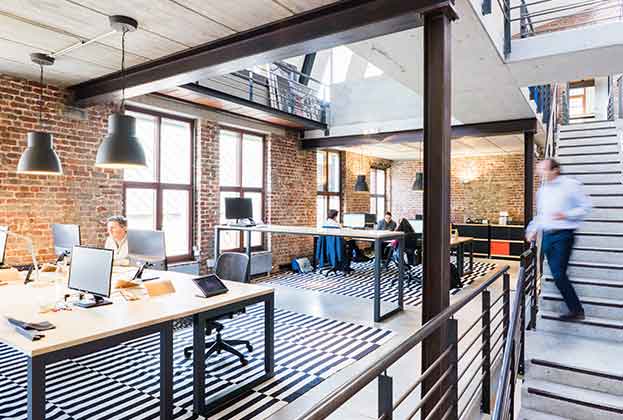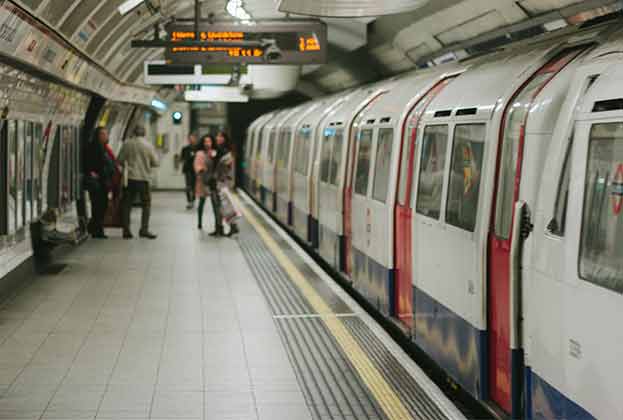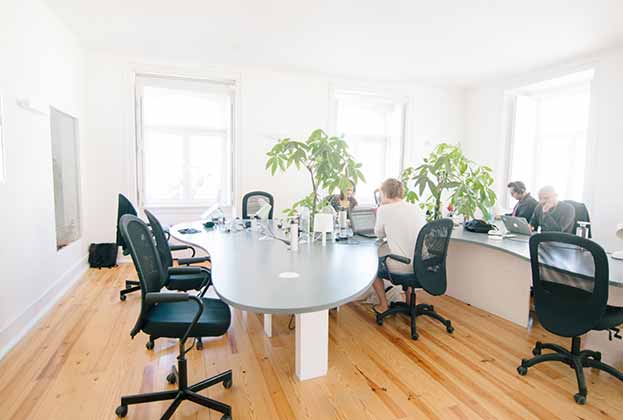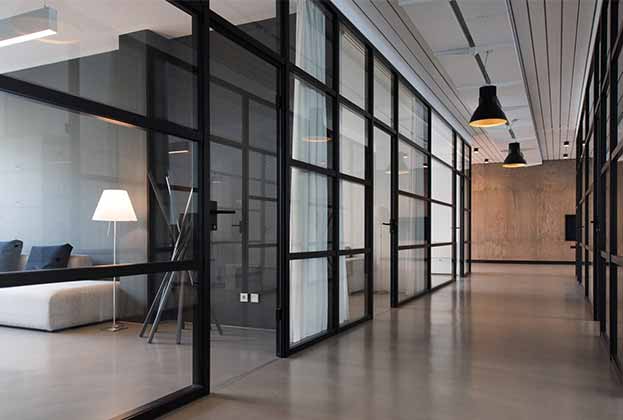Across the UK, on average, 80% of respondents work in an open-plan office, while a third of respondents believe their company do not possess the relevant technology to allow them to work flexibly
Improving productivity
The layout of office space has changed in the last decade with occupiers predominantly moving from a private office/cubicle-style fit-out to an open-plan office. The benefits of open-plan working and hot-desking have been discussed considerably within the real estate industry. It is believed that an open-plan office style and hot-desking can encourage greater collaboration between colleagues and foster internal networking opportunities, particularly as the density of desks can be increased. More staff are working remotely which reduces their need to have a permanent desk.
Occupiers are actively encouraging hot-desking (not having a permanent desk) as they are able to occupy their office space more efficiently which has resulted in a significant reduction in the amount of space corporates occupy. This has provided an opportunity to reduce real estate costs. Across the UK, on average, 80% of respondents work in an open-plan office, which is the highest rate across Europe. London has the highest utilisation of open-plan offices across the UK with 89% of respondents stating they work in an open-plan office.
However, despite hot-desking and an open-plan layout being adopted by the majority of occupiers, only 12% of respondents believe this way of working increases their productivity which is the lowest rate in Europe. As shown in Chart 3, 37% of ‘open-plan' workers believe that the office layout has a negative impact on their productivity, nearly double the level of response for those working in private office space.
Additionally, 45% of respondents believed that hot-desking decreases their productivity. Over 60% of respondents would most like to spend the majority of their working time from their own dedicated desk as they enjoy the familiarity of their personalised workspace with only 3% favouring a shared desk (hot-desking).
Rising noise levels in an open-plan layout can prevent certain members of the workforce from completing work efficiently. Occupiers need to provide a choice of different working environments for their staff in the office to cater for the needs of workers who require a quiet space to work productively. This could be achieved with dedicated quiet rooms or quiet break-out areas where no phones are allowed. It is unlikely that occupiers will revert to a private office fit-out and therefore occupiers need to ensure there are multiple locations within the office where staff can work in different environments. At present, more of the respondents in London spend their working time away from the desk. It is less frequent outside of London. The onus is on the tenants to ensure that a choice of micro-locations are available for office workers to complete and concentrate on their current office-based task.
Flexible working
Occupiers need to address the current imbalance between the move towards hot-desking and the desire for staff to have their own dedicated desk. This could be achieved by giving staff the ability to modify a shared desk. It is important that there are a variety of different options available to workers on how they want to work to ensure that productivity does not fall.
We predict, however, that the proportion of respondents who prefer to have their own dedicated desk will fall in the future. It is unlikely that younger members of the workforce will experience having their own dedicated desk with hot-desking becoming more increasingly adopted by occupiers.
Remote working is part of the modern office employees' daily routine for lots of workers. According to Work From Home Week, 4.2 million people regularly work from home in the UK. Our survey uncovered that 19% of respondents preferred to work from home. The majority of occupiers have embraced flexible working, with 54% of respondents believing that the company they worked for encouraged them to work flexibly. However, on average across the UK, a third of respondents believed their company did not possess the relevant technology that allowed them to work flexibly as effectively as possible. This view was most apparent in Glasgow with 42% of respondents believing they couldn't work remotely successfully due to poor technology.
It is clear from the survey that significant technological enhancements are required to ensure that productivity levels don't fall when employees are working remotely.
Read the articles within Savills What Works Want Survey below.
.jpg)





